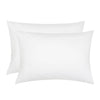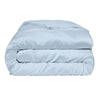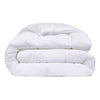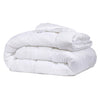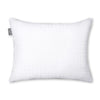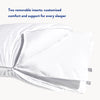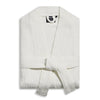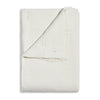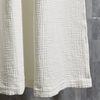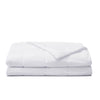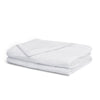The Daily Miracle
Does Your Body Temperature Rise When You Sleep?
Published
September 21, 2022
Author
Bridget Reed

You may fall asleep at the perfect temperature some nights. Your pajamas are just the right amount of cozy-yet-cool, and your bedding is clean and fresh. You’re able to snuggle up and drift off, thinking only about how incredibly comfortable you are at that moment.
Those moments are great — until you’re interrupted from this dreamy sleep by waking up in the middle of the night, covered in sweat and desperate to shed all of your blankets and layers as soon as possible. If this happens to you often, it can be really frustrating.
It may leave you wondering whether or not your house has thermostat elves that change the room temperature in the middle of the night… or if your core body temperature actually does increase while you rest.
You’ve probably heard people talk about whether they “sleep hot” or “sleep cold.” If you fall into the former category, you may be wondering — does your body temperature rise when you sleep?
To lay these questions to rest so that you can get some, let’s talk about your body’s temperature regulation and temperature changes. Then, we’ll cover how to improve your sleep quality if you struggle with night sweats so you can get a good night’s sleep.
What Happens to Your Body While You Sleep?
You’ve probably heard of a little thing called your circadian rhythm. Your circadian rhythm is the cycle your body follows in terms of mental, physical, and behavioral changes throughout a 24-hour day.
These changes occur mostly in response to changes in light — it’s why jet lag can be such a struggle to get over. Your body’s rhythm expects to follow a certain route, but in another time zone, it may be light when you’re used to it being dark, causing a little confusion.
It’s also why the average sleep environment is pretty dark. It’s a key part of sleep onset, and bright lights (especially blue light) can significantly negatively impact your overall sleep cycle.
That’s not to say that everybody can sleep well in the same environment, as the human body is a pretty variable thing, but generally, dark tells your body to sleep, and light tells it to stay awake.
In addition to a non-conducive sleep environment, sleep temperature can have a major effect on your sleep, which is a common reason why people struggle to sleep through the night. This is because your body’s thermoregulation follows your circadian rhythm.
What Does This Mean For Your Body Temperature?
Because your core body temperature follows this 24-hour cycle, barring medical issues, most people’s body temperature does the same thing when you go to sleep: it actually decreases. This is related to your heart rate, which tends to slow when you enter rapid-eye-movement sleep (REM sleep).
So we’re sorry to say, hot sleepers, but your body temperature doesn’t rise at night. However, other factors can lead to overheating despite your body’s natural temperature drops:
The Impact of Bedding Type and Room Temperature
One of the main reasons many people can’t sleep through the night is their bedding.
Here’s why:
One of the main ways your body releases body heat throughout the night is through your hands and feet. Blood flow directs heat out toward your extremities, where it is released into your environment.
This is usually fine, but if your bedding is too warm and restrictive, this can lead to a rise in the ambient temperature around you and, in turn, cause a rise in your skin temperature. Some materials like flannel might cause issues for those prone to night sweats.
Your bedroom temperature can lead to fluctuations in your body temperature while you sleep, and so environmental heat is another leading cause of hot flashes and disturbed sleep.
Generally, the ideal sleep temperature is around 65 degrees Fahrenheit, but experts tend to recommend setting thermostats anywhere from 60 to 67 degrees, depending on personal preference.
Once you get outside of that range, sleep patterns may be disturbed. While you’re sleeping, your body’s ability to regulate your temperature isn’t as strong as it usually is — which is why you may find yourself waking up in a pool of sweat.
How Can You Cool Down?
Work With the Temperature
The obvious way to cool down at night is to invest in air conditioning if you live somewhere hot and think your environment is affecting your sleep. If air conditioning is out of the question, getting a standalone fan or keeping your ceiling fan on at night can help keep the air moving and lower the temperature while you sleep.
Some people find it helpful to sleep with wrapped ice packs or put their pillows in the freezer 15 minutes before bedtime.
Opt for Thermoregulating Bedding
Your bedding plays a big part in your sleep temperature. Investing in the right sheets can make all the difference in helping your body regulate its temperature:
Our Miracle Sheet Set is the perfect way to stay cool all night long — no more night sweats forcing you into a constant cycle of laundry! Our sheets are infused with natural silver, which makes them naturally thermoregulating. Additionally, silver’s unique properties prevent up to 99.9% of all bacterial growth.
That means fewer odors, fewer skin problems, and a longer just-out-of-the-wash feeling from your sheets. And if you’re worried that cooling sheets mean you’ll be uncomfortable or less cozy, there’s no need.
Our sheets are luxuriously soft and made from USA-grown Supima cotton, one of the highest quality cottons in the world. These 500 thread-count sheets will feel like the height of luxury while you drift off and help you regulate your temperature so that you wake up well-rested the next day.
Fine-tuning your comforter situation can also be pretty helpful in keeping yourself cool while you sleep. The Miracle Comforter comes with all the fluff you need for a super-luxe hotel-esque experience without the night sweats to go along with it.
Like our sheets, the Miracle Comforter is infused with silver, which can help you remain at the perfect temperature because it’s ultra cool and ultra-breathable. It’s also hypoallergenic, all-natural, and 100% vegan.
If you’re someone who wakes up sweating, but your partner likes your current cushy, environmentally-friendly comforter, switching to this ultra-luxurious, 500-thread count, full and bouncy duvet won’t create much of an argument.
Additional Lifestyle Habit Changes
Running or intense exercise before bedtime can increase your heart rate, making you sleep hotter. Getting in a daily workout in the morning ensures your heart will have time to slow down before you change into your pajamas and climb into bed.
Additionally, taking a warm bath can help you lower your body temperature so you can drift off to sleep that much easier. Paired with new sheets and a lower ambient temperature, you’ll have to get a second alarm to ensure you’re up in time for the day, let alone sleep through the night.
In Conclusion
Getting better sleep is beneficial to you in so many ways. It helps you wake up feeling refreshed in the morning, which can lead to a more productive and enjoyable day. Not having to deal with early morning sleepiness and grogginess can also increase the chances of engaging in less-than-healthy habits… like reaching for multiple cups of coffee or energy drinks throughout the day. (Hint: drinking coffee after 3:00 PM can seriously disrupt that night’s sleep.)
Overheating while you sleep can negatively impact how your body goes through its different sleep stages, leading to a lower quality of sleep overall. It’s not because your body warms up in the night — it’s usually due to environmental factors (but you might want to visit your doctor to check for sleep disorders if you don’t see any improvements).
But this is good news! It means that your quest for deep sleep is reachable with some minor lifestyle and bedding changes to help keep you cool all night long.
Sources:
-
What Are Circadian Rhythms? | National Institute of General Medical Sciences
-
Mechanisms of Sleep-Disordered Breathing: Causes and Consequences | National Library of Medicine
-
Effects of Thermal Environment on Sleep and Circadian Rhythm | Journal of Physiological Anthropology
-
The Best Temperature for Sleep: Advice & Tips | Sleep Foundation
-
This is the best time to have your cup of coffee | CNBC


